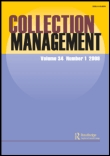
Collection Management
Scope & Guideline
Cultivating Excellence in Library Collection Management.
Introduction
Aims and Scopes
- Diversity and Inclusion in Collections:
A significant emphasis on diversifying collections to reflect a broader range of voices and experiences, particularly in children's and young adult literature. This includes integrating diverse authors and topics into library collections. - Collection Development Policies:
Exploration of effective collection development policies and strategies that libraries can adopt to meet the evolving needs of their patrons, including case studies and surveys that highlight best practices. - Impact of Technology on Collections:
Analysis of how digital resources, such as e-books and streaming media, are reshaping collection development and usage patterns in academic and public libraries. - Assessment and Evaluation of Collections:
Focus on methodologies for evaluating collection effectiveness, including the use of metrics and user feedback to inform collection decisions and improve patron engagement. - Community-Centric Collection Strategies:
Development of collections that reflect the specific needs and demographics of local communities, including initiatives that involve collaboration with local educators and community organizations.
Trending and Emerging
- Diversity, Equity, and Inclusion (DEI):
There is a growing emphasis on DEI within library collections, as evidenced by numerous studies addressing the need for diverse materials that represent various cultural, racial, and social backgrounds. - User-Centered Collection Development:
An emerging trend focuses on incorporating user feedback and preferences into collection decisions, ensuring that libraries meet the actual needs and interests of their patrons. - Impact of COVID-19 on Collections:
The pandemic has led to a significant interest in how library collections are adapting to changing user behaviors, with research exploring shifts in format preferences and usage patterns. - Integration of Technology in Collections:
Technological advancements, such as the use of digital platforms and streaming services, are increasingly influencing collection strategies, with libraries seeking to balance access to both physical and digital resources. - Sustainability in Collection Management:
Emerging discussions around sustainability highlight the importance of responsible collection practices, including the environmental impact of resources and the ethical implications of acquisitions.
Declining or Waning
- Traditional Print vs. Digital Collections:
While there has been significant discussion on print materials, there is a noticeable decline in papers comparing traditional print collections with digital alternatives, as libraries increasingly pivot to digital-first strategies. - Historical Collection Practices:
Research focusing on historical practices in collection management has decreased, likely due to a shift towards contemporary issues such as diversity, technology integration, and user-centered approaches. - General Collection Development:
The broad topic of general collection development appears to be waning as more specific areas, such as diversity, inclusion, and technology impact, gain traction in the literature.
Similar Journals

Publications is a leading international journal published by MDPI, based in Switzerland, that has been at the forefront of scholarly communication since its inception in 2013. As an Open Access journal, it aims to disseminate high-quality research across multiple disciplines, notably in Business and International Management, Communication, Computer Science Applications, Library and Information Sciences, and Media Technology. Its impressive standing is reflected in its 2023 Scopus ranks, with top quartile positions across various fields, including a Q1 ranking in Library and Information Sciences and Media Technology. With a commitment to promoting innovation and collaboration, Publications serves as an essential platform for researchers, professionals, and students alike, allowing them to engage with the latest findings and discourse. The journal's strategic focus on accessibility ensures that knowledge is available to a global audience, fostering an environment conducive to academic and practical advancements. The E-ISSN 2304-6775 identifies its distinct digital presence, making it an invaluable resource for anyone passionate about cutting-edge research.

LIBRARY AND INFORMATION SCIENCE
Championing knowledge for a digitally informed society.LIBRARY AND INFORMATION SCIENCE is a specialized academic journal dedicated to the advancement of knowledge and scholarship in the field of library and information sciences. Published by MITA SOC LIBRARY INFORMATION SCIENCE, this esteemed journal has been a crucial platform for scholarly communication since 1980, addressing the dynamic challenges and developments in the information landscape. Although it holds a Q4 category ranking in the Library and Information Sciences according to the 2023 Scopus Ranking, the journal serves a unique niche, providing insights and fostering discussions among a diverse audience of researchers, professionals, and students. With no Open Access options currently available, its valuable research contributions are accessible through institutional subscriptions and library access. The journal aims to disseminate innovative research, case studies, and theoretical explorations that enhance our understanding of information behavior, retrieval systems, library management, and emerging technologies, thus promoting an informed society in an increasingly digital world. Given its focused scope and enduring presence, LIBRARY AND INFORMATION SCIENCE continues to be an essential resource for anyone invested in the future of libraries and information services.
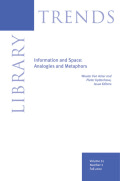
LIBRARY TRENDS
Advancing Knowledge in Information EcosystemsLIBRARY TRENDS is a leading academic journal published by Johns Hopkins University Press, dedicated to the field of Library and Information Sciences. With an established history spanning from 1980 to 2023, this peer-reviewed journal provides a platform for insightful research, innovative practices, and critical analysis addressing contemporary issues in library science. While it holds a respectable Q3 quartile ranking within its category, it ranks #145 out of 280 in Scopus, indicating its significance in the academic community. With an impact factor that reflects the growing importance of the field, LIBRARY TRENDS invites contributions that encompass a wide range of topics, including digital libraries, information technology, and user studies. Although it is not an open-access journal, the content it provides is invaluable for researchers, professionals, and students seeking to enhance their understanding and improve their practices in the rapidly evolving landscape of library and information science. Discover more by exploring the latest issues and join the vibrant discourse shaping our information ecosystems.

KNOWLEDGE ORGANIZATION
Empowering Research in Knowledge OrganizationKNOWLEDGE ORGANIZATION is a prominent journal in the field of Library and Information Sciences, published by NOMOS Verlagsgesellschaft mbH & Co KG. With an impressive impact reflected by its 2023 Q2 category ranking and a Scopus rank of #135 out of 280 in its discipline, this journal serves as a vital platform for disseminating research that advances our understanding of knowledge organization systems and practices. Since its inception in 1993, the journal has provided a convergence of innovative theoretical frameworks and practical applications that address the complexities of organizing knowledge in an ever-evolving information landscape. Although it currently does not offer open access options, KNOWLEDGE ORGANIZATION continues to be essential for researchers, practitioners, and students eager to explore critical methodologies and emerging trends within the field. For those interested in contributing to or gaining insight from high-quality research relevant to library and information sciences, this journal remains an invaluable resource.
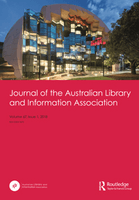
Journal of the Australian Library and Information Association
Championing open access to vital academic insights.Journal of the Australian Library and Information Association (ISSN: 2475-0158, E-ISSN: 2475-0166) is a vital academic resource published by Routledge Journals, Taylor & Francis Ltd, based in the United Kingdom. This esteemed journal serves the field of Library and Information Sciences, having achieved a notable Q2 ranking in the 2023 category quartiles and a position of 74 out of 280 in Scopus ranks, placing it within the 73rd percentile nationally. With an open access model, it facilitates widespread dissemination of knowledge, thereby enhancing the visibility and impact of research within the library and information domain. Spanning a convergence of years from 2017 to 2024, the journal aims to promote innovative research, best practices, and critical discourse that address contemporary challenges in library and information services. It provides a platform for researchers, professionals, and students to engage with leading-edge scholarship, ensuring the continuous advancement of the field and fostering a community committed to excellence in information stewardship.

Biodiversity Informatics
Transforming biodiversity research through open-access data solutions.Biodiversity Informatics is a pivotal open-access journal that has been at the forefront of disseminating research in the dynamic fields of biodiversity data management and informatics since 2004. Published by the University of Kansas, Natural History Museum & Biodiversity Research Center, this journal serves as an essential platform for researchers, practitioners, and students dedicated to exploring the intricate relationships within biodiversity and leveraging informatics to enhance conservation efforts. Although it does not currently have an impact factor listed, its commitment to accessibility ensures that cutting-edge research is available to a global audience, fostering collaboration and innovation in biodiversity studies. As the science of biodiversity increasingly intersects with data technology, Biodiversity Informatics plays a critical role in shaping knowledge and understanding within this vital field.

Bibliotecas-Revista de la Escuela de Bibliotecologia Documentacion e Informacion
Transforming Library Practices through Cutting-edge ResearchBibliotecas-Revista de la Escuela de Bibliotecologia Documentacion e Informacion, published by the Universidad Nacional, Escuela de Bibliotecología, Documentación y Información in Costa Rica, is a vital Open Access journal that has been serving the academic community since 1980. With an E-ISSN of 1659-3286, it focuses on the field of Library and Information Sciences, providing a platform for innovative research, studies, and discussions that contribute to the ongoing development of library practices and information management. Recognized in the 2023 Scopus rankings as part of the Social Sciences category, the journal occupies the Q4 quartile with a ranking of #202 out of 280, reflecting its specialized niche within this rapidly evolving discipline. Over the years, from 2019 to 2024, Bibliotecas has aimed to promote scholarly communication and access to knowledge for researchers, professionals, and students alike, making an important impact in enriching academic discourse and supporting the field’s advancement.

Revista Eletronica Ventilando Acervos
Fostering Dialogue on Cultural HeritageRevista Eletronica Ventilando Acervos, with ISSN 2318-6062, is a pioneering academic journal published by the esteemed MUSEU VICTOR MEIRELLES-IBRAM, dedicated to the exploration and dissemination of research in the field of archival studies, museum studies, and heritage conservation. As an open-access journal, it provides unrestricted access to a wealth of scholarly articles, promoting the sharing of knowledge and innovative practices among researchers, professionals, and students alike. Situated in Florianópolis, Brazil, the journal not only showcases local research but also contributes to global discourse on cultural heritage and information management. With a vision to foster collaboration and dialogue within the academic community, Revista Eletronica Ventilando Acervos plays a pivotal role in enriching our understanding of archival science and its impact on society, making it an invaluable resource for anyone engaged in this dynamic field.
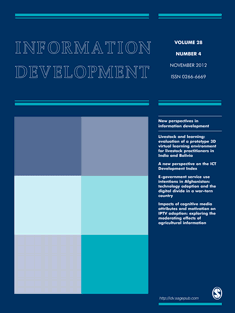
Information Development
Exploring Innovative Practices in Information DevelopmentInformation Development, published by SAGE Publications Ltd, is a prestigious journal focusing on the dynamic intersection of library science and information development. With an ISSN of 0266-6669 and an E-ISSN of 1741-6469, this journal has established itself as a critical resource for researchers, professionals, and scholars in the field since its inception in 1985. With a 2023 Q2 ranking in Library and Information Sciences and a commendable Scopus rank, falling within the 82nd percentile among its peers, the journal provides an invaluable platform for the dissemination of cutting-edge research and innovative practices. Notably positioned in the United Kingdom, the journal offers insightful explorations of contemporary challenges and advancements in information access, management, and policy. Although currently not an Open Access journal, it continues to contribute significantly to its field by fostering a robust academic dialogue and sharing knowledge essential for the evolution of library and information sciences. Scholars and practitioners alike are encouraged to engage with Information Development as it remains instrumental in navigating the complexities of today's information landscape.
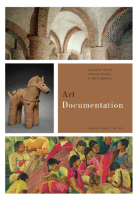
Art Documentation
Elevating Art Narratives Through DocumentationArt Documentation is a distinguished journal published by the University of Chicago Press, dedicated to advancing the field of art documentation and its related disciplines. With a focus on interdisciplinary studies encompassing Visual Arts, Performing Arts, Archaeology, and Library and Information Sciences, this journal offers a pivotal platform for researchers and professionals aiming to enhance their understanding and practice in these areas. Despite not providing open access options, its contributions are invaluable, showcasing innovative research and discussions that reflect contemporary challenges and methodologies in the art documentation sphere. As evidenced by its Scopus ranking, placing it within the 68th percentile for Visual Arts and Performing Arts and the 49th for Archaeology, the journal demonstrates a commitment to high-quality scholarship. Published annually and spanning converged years from 2015 to 2023, Art Documentation remains vital for academics and practitioners seeking to engage with the latest trends, methodologies, and scholarly discourses enriching the art documentation field.